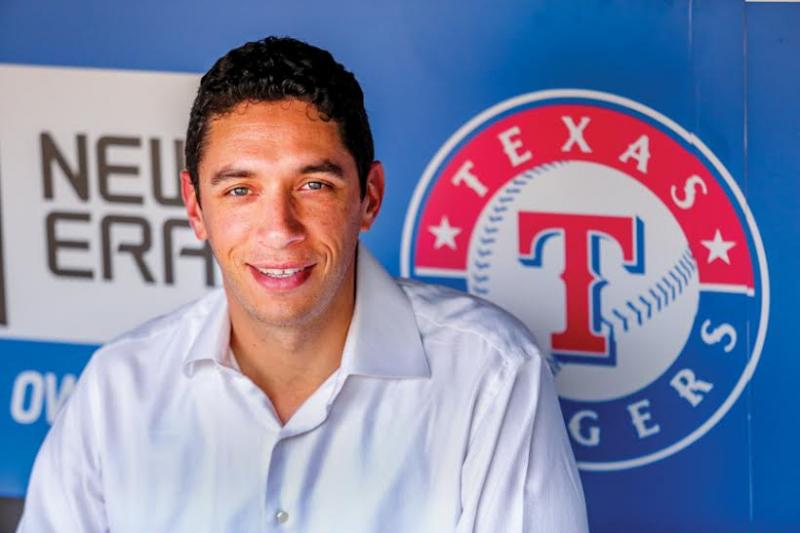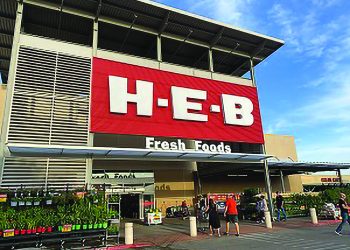
Texas Rangers President of Baseball Operations and General Manager grew up in Queens, N.Y., played Little League Baseball, became a Mets fan and spent time at Shea Stadium.
“I loved the game and I was always interested in the transaction aspects and how teams were built, but never considered what I’m doing now as a possibility for a career. I thought if anything about getting into sports that maybe [I’d work in] the NFL because they had the ‘cap’ and I heard about these people called ‘capologists.’ I was a economics major in college and sort of a math nerd and thought maybe I could go that path, but didn’t really pursue it.”
After graduation his Cornell University college roommate, A. J. Preller, gained an internship with the Phillies while Daniels moved to Boston for a job with the parent company of Dunkin Donuts.
“I spent more time focused on AJ’s job with baseball than I did my own. I went with him to the winter meetings a couple of times, and that led to the internship with the Colorado Rockies in 2001 when I was 23.”
A year later he joined the Rangers front office, first as Baseball Operations Assistant before being elevated to director of baseball operations in 2003 and named assistant general manager the following year.
In 2004, Preller joined Daniels in Arlington, where he remained for 10 years before becoming the general manager for the San Diego Padres. The two former roommates are now both at the top tier of their team’s front offices.
There were always two questions
When he became the general manager of the Texas Rangers in 2005, Daniels frequently encountered two questions at just about every public appearance.
The first one was, “how old are you?” and the second, “when are we going to get some pitching?”
Both were understandable. JD, as everyone came to know him, would face those questions again and again. He had just become the youngest GM in all of Major League Baseball and most wondered if a 28-year-old had the kind of experience required to build a winning team.
The other query was one that sports writers and the team’s faithful followers had been asking long before JD joined the club. Rangers’ fans had always longed for the kind of pitching staff that characterized championship teams.
After his promotion to the position considered pivotal for any team, he went to work doing what general managers do – building an organization all the way from scouting young prospects to delivering top level players to the field of the major league ballpark.
The results are stunning
Just three years later, Baseball America ranked the Rangers as the number four system among the 30 major league teams. The following year they gained the distinction of having the game’s best farm system.
In 2012 the Rangers were selected as the Topps Organization of the Year that annually highlights the Major League team that has shown outstanding performance, depth and talent throughout its major and minor league teams.
Success like never before in the history of the franchise, all the way back to its origins as the Washington Senators, has moved the Rangers into the ranks of the sport’s best teams. The club’s first- ever trip to the World Series came in 2010. The Rangers repeated the feat the following year, and JD became only the fifth general manager in MLB history ever to make at least two World Series appearances with his current team.
It all earned him Baseball American’s coveted 2010 Major League Executive of the Year award. Then the 107-year-old Boston chapter of the Baseball Writers Association recognized him as the 2011 Major League Executive of the Year.
Nobody wonders if he’s old enough for the job any more.
What about that pitching?
Okay, so what about that pitching question? JD acknowledges that will always be something everyone has on their mind, but he has better answers than ever. As Spring Training is currently underway, the Rangers’ projected starting rotation features two guys that every other team in the major leagues would love to have.
The 2008 World Series MVP and three time All-Star Cole Hamels together with 2013 American League strikeout leader and three- time All Star Yu Darvish fit the definition of “awesome.” Last season’s 17-game winner Colby Lewis, along with Derek Holland and Martin Perez, are likely in the rotation, with other potential candidates being Chi Chi Gonzalez, Nick Martinez and A. J. Griffin.
Cole says he’s with the team that was at the top of his list when the Phillies, facing a rebuilding program, put him up for trade last season. Yu proclaimed he’s already capable of throwing the ball at 95 MPH after recovering from last year’s surgery.
Closer Shawn Tolleson appears ready to repeat or exceed his remarkable record of converting 35 of 37 save opportunities last season.
JD explains all this is “the design of the club,” and asks, “How many organizations have ever had a combination of what Hamels and Darvish could and should be?”
It’s consistent with the whole philosophy of the Rangers that JD defines: “Our goal is to give ourselves a chance (in the post season) every year.”
A blockbuster trade defines JD’s career
Perhaps all of that was set into motion in 2007 when JD made a career-defining trade that he and just about everyone else now recognize as a blockbuster deal.
Seven players and prospects were involved in the swap, led by coveted slugger Mark Teixeira going to the Braves.
The Rangers picked up pitcher Matt Harrison, who emerged as a starter in 2009.
Another prospect obtained was Elvis Andrus, now a two-time All Star and widely recognized as an elite shortstop and clubhouse leader.
Next was Neftali Feliz, who joined the Rangers bullpen in 2009 and was named a 2010 All Star and Rookie of the Year.
That trade formed the club’s foundation and set the stage for a long-term plan resulting in the Rangers winning back-to-back American League Pennants and a club record of three consecutive seasons of play-off baseball.
“My job now,” Daniels explains, “is to keep the team two steps ahead and never short circuit this thing and step back to where we were before.”
Translation: the Rangers GM plans to succeed with the club’s goal of having a chance to win championships every year.
Keys to another championship season
Asked about the keys to reaching that goal in the upcoming season following their division championship last year, JD said there are three main things that need to happen:
“First is the health of our starting pitching, second is the continued development of our younger players, and third is production in the middle of the (batting) order – that’s going to be critical for us.”
Team manager Jeff Banister was another JD acquisition. The Rangers’ skipper was named American League Manager of the Year for the team’s performance in 2015. He compliments JD’s objectives by simply saying, “We’ve got some unfinished business to attend to, and that mission is now getting underway.”
That statement matches JD’s soft-spoken, behind-the-scenes persona that colleagues say masks his delightful sense of humor. “Put it out there where everyone can see it,” one says on the promise of anonymity, “let them see the fun guy we all know and love.”
Family
Looking back at that Boston job before baseball, Daniels marks the point in time when his future would take another kind of turn – a really significant, life-changing one.
“I had a job in business development for them when they were trying to co-brand Dunkin Donuts, Baskin Robbins and a sandwich they called Pogos – that didn’t work. The biggest benefit of working there – it’s where I met my wife.”
Later, baseball would bring them to Texas.
He and Robyn reside in Southlake with their son, Lincoln (9) and daughters Harper (8) and Charlotte (4), for whom some alternative, standby, return-home arrangements were made as her arrival might have happened in the midst of the 2011 World Series.
She held off until about two weeks later, so those contingency plans didn’t have to be executed.
Robyn described her husband to SportsDay a couple of years ago: “He’s an amazing father and husband. The kids adore him. I feel like I’m amazingly lucky that I found someone who can do both.”
JD enjoys sharing his career with the family.
“They all come to Spring Training at spring break every year and make different road trips as a family during the regular season. Lincoln has joined me for some other road games during the last couple of years and came on a plane by himself to Houston at the end of last season. It was cool. He’s as much into it as I am and gets more heated than I do after a loss.”
It seems certain that JD’s kids are also realizing what a major role their father plays in delivering a quality experience for the fans of the National Game – a legacy surely to be extended in years to come.
















